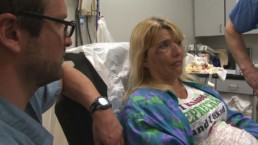Review: ‘Remote Area Medical’
A three day clinic set up in Tennessee caters to those unable to afford a doctor and resort to charity outreach as a primary source of healthcare.
It looks like a scene from a Coachella weekend; thousands of people camping in cars, sleeping in tents in empty parking lots and enjoying general tailgating activities. While on the outside this looks like a fun event, it’s actually a look at a tough reality. Directors Jeff Reichert and Farihah Zaman capture the story of a healthcare crisis that hits close to home for too many people in the documentary Remote Area Medical– not being able to afford a doctor and resorting to charity outreach as a primary source of healthcare. In this eye-opening film, we get an intimate look at a Tennessee clinic’s operation for three days and experience first hand the hardships that many Americans encounter to receive basic medical care.
From the beginning, we are introduced to people with a variety of health concerns, whose sole mission is to be seen by a doctor. Remote Area Medical is an organization that travels to various towns and assists in weekend-long healthcare clinics that are free to whomever shows up and in this film, they travel to Bristol, Tennessee, the birthplace of country music. Since the towns they travel to have higher populations of uninsured people or those who can’t afford to drive to a doctor’s office, these clinics are overcrowded. Because of the high demand, R.A.M. volunteers pass out tickets on a first come, first serve basis. To ensure a spot in line, and an appointment with a doctor, some people camp out in cars for three nights prior to the clinic’s opening.
While it hurts their pride to be waiting in line like cattle to undergo a routine health exam, the truth is that their self-esteem is significantly higher after leaving the clinic
It is not a glamorous situation, and Remote Area Medical doesn’t try to convince us otherwise. The flaws in the organization are acknowledged and then passed over. Politics or statistics are not mentioned, this is not a propaganda type film. It is people-driven whose story on its own is enough to want to evoke a change and find out more about this organization.
These people are not victims, and they are not painted as such, but they do evoke extreme sympathy. For many, R.A.M. is the only way they can see a doctor, dentist, or optometrist, and the pure gratitude and joy that they feel after leaving the clinic is heartwarming. While it hurts their pride to be waiting in line like cattle to undergo a routine health exam, the truth is that their self-esteem is significantly higher after leaving the clinic. It’s a psychological sacrifice every one of them is willing to make.
Unfortunately, that fact is that the “Remote” in “Remote Area Medical” isn’t totally accurate; the people in need come from all over the United States, from places where doctors should be readily available. Even though we are supposed to be living in “the land of opportunity,” R.A.M. founder Stan Brock points out that with the limited medical access in these towns, these people might as well be living on the moon. What Reichert and Zaman portray in this film is that the problem is local, but fortunately, Remote Area Medical is proving to be extremely effective. And while charity will never replace an official healthcare system, the benefits that this organization provides, as reflected in this documentary, will hopefully grow its availability by leaps and bounds for those who depend on it. One thing’s for sure, I’ve never seen someone so happy to see the dentist until I saw this film.
Morgan Rojas
Certified fresh. For disclosure purposes, Morgan currently runs PR at PRETTYBIRD and Ventureland.


I stumbled upon this documentary on DISH Network (cable). I was happily intrigued to read on of the cards during the intro that stated that this charity, Remote Area Medical, responds over 60% of the time to inside the US. It’s wonderful to see an operation like this take care of our own.
It’s not about a failing healthcare system in the US, we have a very good system. It’s more about people who are remote, away from decent medical care; Be it in the Appalachia Mountains, deserts of the South West, or the wide-open plains. I have lived in the last two and can tell you “a quick trip to the doctor” is anything but quick… especially when you have a harvest to get in.
G-d bless these people. I’ll be buying a copy on DVD from Amazon and making a donation to them tonight!
https://ramusa.org/